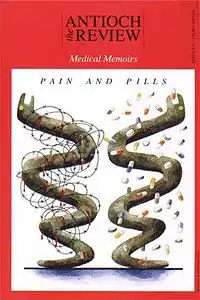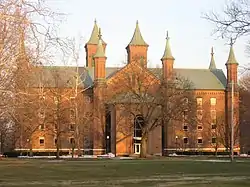The Antioch Review
The Antioch Review is an American literary magazine established in 1941[1] at Antioch College in Ohio.[2] The magazine is published on a quarterly basis.[2] One of the oldest continuously published literary magazines in the United States, it publishes fiction, essays, and poetry from both emerging and established authors.
 | |
| Discipline | Literary journal |
|---|---|
| Language | English |
| Edited by | Robert S. Fogarty |
| Publication details | |
| History | 1941 to present |
| Publisher | |
| Frequency | Quarterly |
| Standard abbreviations | |
| ISO 4 | Antioch Rev. |
| Indexing | |
| ISSN | 0003-5769 |
| JSTOR | 00035769 |
| Links | |
About
The Antioch Review was founded in 1940 by small group of Antioch College faculty who sought to establish a forum for the voice of liberalism in a world facing the forces of fascism and communism. The first publication was released in 1941. In its early years, it was edited by collective, among whom were Paul Bixler and George Geiger, and later Paul Rohmann.[3]
The magazine continued to publish despite the 2008-2011 closing of Antioch College (which reopened in 2011).
While its pages have been populated by innumerous academics, The Antioch Review does not publish footnotes, thus their contributions have been largely non- (rather than anti-) academic and journalistic in nature. See Among the magazine's notable contributions, it published an article by Robert K. Merton in 1948 that introduced the world to the concept of the "self-fulfilling prophecy."[4]
Robert Fogarty, editor of The Antioch Review since 1977, received the PEN/Nora Magid Award for Magazine Editing in 2003.[2]
Free speech is taken seriously at The Antioch Review. The Winter 2016 issue published an article considered offensive to many transgender individuals and supporters, but was nevertheless defended against a wave of criticism on the grounds of free expression of ideas and opinions, even when they run counter to one’s own.[5]
As of October 2020, publication of the Review has “just sort of stopped,” according to the magazine’s long-time production editor Jane Baker; and, the college did not respond regarding the future of the Review when queried by editor Fogarty, who had been furloughed since April. In August, Fogarty and Ben Zitsman, the magazine's managing editor, were served a cease-and-desist order, barring their continued involvement with the magazine, by the college's legal counsel. [6] The college subsequently made a statement that because of the college’s financial challenges, the publication was being put on hiatus after the Winter 2020 issue while the college explored options.[6]
See also
References
- "Top 50 Literary Magazine". EWR. Retrieved August 17, 2015.
- "The Antioch Review". New Pages. Retrieved 24 April 2016.
- Fogarty, Robert S. "A History of the Antioch Review: The Survival of the Imagination."
- Dunbar, Nicholas (2001). Inventing Money. John Wiley & Sons. p. 19. ISBN 978-0-471-49811-7.
- "Free Speech, 'The Antioch Review' and an Antitransgender Article". Scott Jaschik, Inside Higher Ed, May 6, 2016. Retrieved August 15, 2020.
- "Uncertain fate for Antioch Review". Audrey Hackett, Yellow Springs News, October 29, 2020. Retrieved December 11, 2020.
